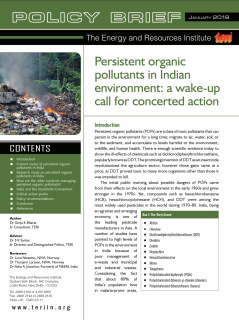
India, as a major pesticide producer and agrarian economy, faces high levels of persistent organic pollutants (POPs) contamination in its environment, largely due to poor management of e-waste, municipal and industrial wastes. Studies highlight the alarming accumulation of POPs in critical ecosystems, such as the Ganges River.
This policy brief highlights the need for India to shift from a retrospective approach to a proactive pollution management based on risk management, with policies formulated in the light of scientific knowledge. It underscores the importance of addressing the fragmented network of laws and regulations to develop a unified system with clear mandates for managing hazardous chemicals and waste effectively.
It also calls on India to prioritize investments in pollution control, expand its capacity for scientific monitoring and foster international cooperation to address the gaps in managing POPs.
